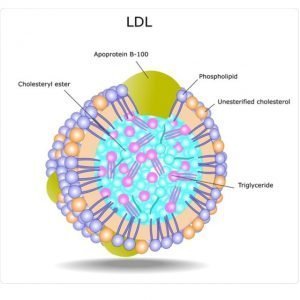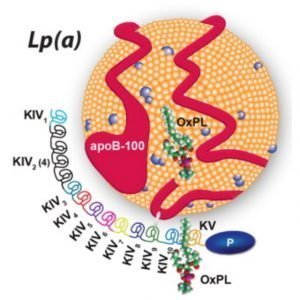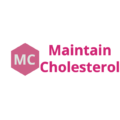How to Reduce Elevated LDL Cholesterol?
Table of Contents
Introduction
Cholesterol is naturally produced by your body and is essential to its function throughout your everyday life. However, excessively high levels of cholesterol—in particular, LDL cholesterol— are bad and can lead to serious health problems such as clogged arteries, heart disease, and stroke. Learn here how to reduce elevated ldl cholesterol levels and how reducing lipoprotein(a), lp(a) cholesterol, is a better way to reduce cholesterol.
What is LDL Cholesterol?

LDL stands for Low-Density Lipoproteins. This type of cholesterol is produced by the liver and is instrumental in the creation of cell walls, hormones, and digestive juices. However, when your LDL level is high, it can start to form a plaque-like substance on the walls of your cardiovascular system, blocking the natural flow of blood and leaving you at severe risk for heart attack and stroke. Put simply, LDL is the bad kind of cholesterol. But fear not – there are several ways in which you can reduce LDL cholesterol and encourage the development of High-Density Lipoproteins (good cholesterol), which actually function to limit the level of LDL cholesterol in your system.
Consider Screening for Lipoprotein(a) [lp(a)]

Lipoprotein(a) has recently been shown to be a bigger risk factor than LDL cholesterol. It is proven to be an emerging and independent risk factor for heart disease. It is a molecule similar to LDL cholesterol with an additional protein molecule, apo lipoprotein(a), attached to it. People with genetic disorder are found to have higher levels of lp(a) from childhood. If you have a family history of heart disease and very high cholesterol you may have higher levels of lipoprotein(a). levels of lp(a) can be tested. Levels of lp(a) >30 mg/dl is a high risk factor.
Ways to Reduce Elevated LDL Cholesterol
There are many ways you can prevent and reduce High LDL
#1 Quit Smoking
If you are in the habit of smoking then your cholesterol levels will go up. Quitting smoking helps reduce your cholesterol levels and reducing the risk of heart disease.
As a result of smoking the body is depleted of the vital antioxidant vitamin c. The human body can store only a certain amount of vitamin C., and so the body soon depletes itself if fresh supplies are not consumed. Smoking cigarettes has a negative correlation to the amount of vitamin c in the blood stream. The relative amounts of vitamin c drop with the increased amount of cigarettes smoked.
According to dr linus pauling the root cause of heart disease is the long term deficiency of vitamin c. Our body does not make the enzyme L-Gluconolactone oxidase an enzyme required to make vitamin C that is functional in most other mammals, plants, insects, and other life forms.
Aim to maintain cholesterol in normal range. There are several quit smoking aids in the market to help you quit smoking.
#2 Drink Alcohol in moderation
Excessive drinking is not good for your health. Quitting drinking alcohol is the best option for you. If you cannot leave drinking completely, then take alcohol in moderation.
Drinking depletes the body of B complex vitamins and antioxidant vitamins. Virtually all heavy drinkers develop fatty liver. Up to 35 percent develop alcoholic hepatitis and between 10 and 20 percent develop cirrhosis.
If your liver is affected due to drinking the then you should take some supplements like milk thistle to detox the liver.
To learn more about how to quit drinking alcohol visit my blog page “best way to quit drinking alcohol: 2021 buyers guide”.
In this guide find everything about the best way to quit drinking alcohol. Here you will learn how to quit drinking alcohol and what happens to your body when you quit alcohol. We also help you select the supplements that actually help you improve your liver problem and help reverse heart disease. Please remember that your cholesterol levels improve if you change your drinking habits. You can reverse heart disease and maintain cholesterol levels natural.
#3 Reduce weight
Obesity is a high risk factor for heart disease. Therefore, you should try to lose weight by taking weight loss supplements and eating a Mediterrian diet.
Obesity control is very essential because Obesity is a risk factor for heart disease which you have to take care of to improve heart health and maintain healthy cholesterol levels. SUGGESTION: Even if you are overweight you can still REVERSE HEART DISEASE with the Vitamin Supplements. First FOCUS on reversing heart disease.
To know more on how to reduce weight visit my page “obesity and weight loss” where you will find some of the best weight loss programs.
#4 Diet to reduce elevated LDL cholesterol
Altering your diet is the easiest way to reduce elevated LDL cholesterol, and should be your first course of action, as every cholesterol-reducing strategy starts with your dietary habits.
A balanced diet consisting of fruits, vegetables, whole grains, fish, and various plants will significantly help you lower your LDL cholesterol level. It’s best to consume vitamin c rich fruits and vegetables as they provide nutrients that can help reduce high cholesterol.
Fish and other foods rich in omefa-3 will also help you to lower triglycerides and lp(a). Limit the amount of red meat, eggs, and dairy you consume.
Plant-based diets like Dean Ornish diet not only help lower your LDL, but they can also help clear plaque buildup from your arteries.
#5 Exercise to reduce high LDL cholesterol
Starting a simple exercise routine is another way to help reduce elevated LDL cholesterol level. And if you compound working out with the dietary tips listed above, you could potentially reduce your LDL level by over 37 percent and increase your HDL cholesterol by over 5 percent in just two months.
Not to mention the added benefits of losing weight, decreased stress, and higher energy, exercising is an all-around great activity to incorporate into your life.
Aim for 30 minutes of physical activity, four to five times each week, and you’ll be well on your way.
Yoga is one of the best exercise for reducing the risk of heart disease. If you are a beginner to yoga see the article 5 best yoga poses for beginners to increase flexibility.
If you are obese then aerobic exercises like swimming, cycling, using an elliptical trainer, walking, rowing are best for you.
#6 Supplements to reduce elevated LDL cholesterol
While diet and exercise should be your two main options for fighting off LDL cholesterol, you can also look into the various dietary supplements that are on the market today.
Keep in mind that these natural products have not been fully proven to reduce your level of LDL cholesterol, but they may be able to help along the way. They may lower LDL but what about increasing HDL if their levels are low.
Ideally the supplement should also increase HDL levels if their levels are low. Only then we can have normal lipid levels. When only LDL levels are lowered and HDL levels are low then we cannot have normal cholesterol levels.
According to recent research certain vitamins like vitamin c have the ability to lower LDL and increase HDL levels. These vitamins also have the ability to lower lipoprotein(a), a kind of cholesterol which is more atherogenic than LDL.
#7 Supplements that remove cholesterol by adsorption:
A variety of herbal supplements like plant sterols and stanols are used for reducing LDL cholesterol. These supplements adsorb excess cholesterol from the intestine and send it to liver for excretion from the body.
These Sterols and Stanol type of phytochemicals cannot lower lp(a).
#8 Statins :
Statins lower cholesterol by inhibiting cholesterol synthesis. They do not increase HDL. It is observed that people who are on statins generally have low HDL levels.
Statins do not reduce lipoprotein(a). Statins do not increase HDL levels.
#9 Niacin ER:
Niacin ER is used to lower cholesterol. It reduces LDL and triglycerides. Niacin increases HDL cholesterol. Niacin is also very effective in reducing lipoprotein(a).
Niacin is a very interesting molecule, reducing both LDL as well as Lp(a) and increasing HDL cholesterol levels. If you wish to know more about niacin visit my blog page best niacin 500 mg tablets to select the product.
In case you wish to know about use of niacin to lower lipoprotein(a) visit my blog page reduce lipoprotein(a) with niacin er.
#10 Fish Oil:
Fish oil and other omega-3 containing supplements reduce triglyceride levels and LDL levels. Omega-3 fatty acids are essential fatty acids meaning they are not synthesized in the body. we have to take them form the food that we use. Therefore eating fish is recommended to maintain cholesterol levels.
They also lower lp(a) levels in combination with niacin.
Is Reducing Elevated LDL Cholesterol the Right Way to Prevent or Reverse Heart Disease
The medical community has found no evidence that eating cholesterol is bad for heart health. They have removed it from the guidelines.
Most of the supplements mentioned above are used because they can adsorb the excess cholesterol from the intestine and send it to the liver for removal from the body. Has it served any purpose?
Next, the medical community said that it is saturated fats and trans fats that causes heart disease. This is also a myth. There is no experimental evidence that saturated fats increases LDL levels.
Scientific research conducted in 1990’s has shown that LDL cholesterol does not form arterial plaque. The major component found in clogged arteries is Lipoprotein(a), a molecule which is made of LDL cholesterol and is highly atherogenic. These studies have changed the thinking entirely on the root cause of heart disease. Lp(a) plays a great role in heart disease. Thus it becomes important that we should try to have normal lipoprotein(a) levels and that high levels of lipoprotein(a) is a high risk factor for heart disease.
Choosing the right supplement is very important
“If we want to change our cardiovascular health in a profound way, we have to look at it from an all-encompassing point of view—we have to look at the root cause of elevated cholesterol and different ways to reduce elevated LDL cholesterol or lp(a) cholesterol.
Targeting reducing elevated lp(a) cholesterol will give you good results. Dietary supplements containing vitamin c, lysine & proline are highly effective in reducing elevated LDL cholesterol as well as lowering lipoprotein(a).
Consider omega-3 fish oils, artichoke extract, and green tea extract and niacin ER. Niacin ER not only lowers LDL but it also lowers lp(a). However it cannot remove arterial plaque.
Everyone’s body is different, and it may take a little bit of time to determine what cholesterol-reducing methods work best for you. Whatever program you decide on, stick with it and you’ll be on the right path to a healthier you!
Summary
learn here how to reduce elevated LDL cholesterol levels using statins, plant sterols and stanols, niacin, fish oil and vitamin c lysine and proline supplements. Lowering Lp(a) is very important as lp(a) is a high risk factor of heart disease compared to LDL cholesterol. The most effective way to reduce elevated LDL and lp(a) is through the use of micronutrients.

Pingback: Does Dean Ornish Diet Reverse Heart Disease? Dean Ornish Review